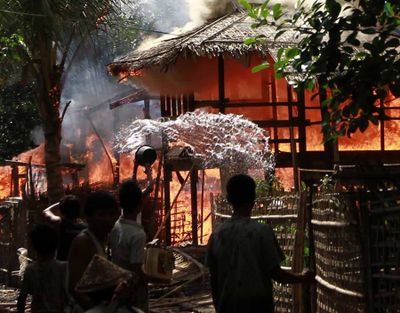Ethnic, religious strife persists in Myanmar

SITTWE, Myanmar – With residents cowering indoors, security forces patrolling a tense town in western Myanmar collected bodies Monday from homes burned to ashes in some of the country’s deadliest sectarian bloodshed in years.
The conflict along ethnic and religious lines has left at least seven people dead and hundreds of homes torched since Friday and poses one of the biggest tests yet for Myanmar’s new government as it tries to reform the nation after generations of military rule. The handling of the unrest will draw close scrutiny from Western powers, which have praised President Thein Sein’s administration and rewarded it by easing years of harsh economic sanctions.
Thein Sein declared a state of emergency in the region late Sunday and pleaded for an end to the “endless anarchic vengeance,” warning that if the situation spun out of control, it could jeopardize the democratic reforms he has begun.
“Sittwe city center is quiet at the moment but we are afraid at nighttime. We are afraid that the Rohingya Muslims would come in boats and torch the villages along the river. We have not slept well for nearly a week,” Sittwe resident Mya Thein said after darkness fell Monday.
Even as truckloads of soldiers patrolled the city, there was scattered violence again, as smoke from burning houses could be seen in at least one neighborhood about 15 minutes drive from downtown Sittwe.
Soldiers and police rushed to the area, while Rakhine civilians, men and women, armed themselves with sticks and bamboo spears with sharpened ends to guard their homes.
The United Nations said it had temporarily relocated 44 of its 150 personnel in Rakhine state. Local state television said cargo and passenger boats to Sittwe were suspended.
U.S. Secretary of State Hillary Rodham Clinton urged a halt to the violence and called on authorities to conduct a quick, transparent investigation.
“The situation in Rakhine State underscores the critical need for mutual respect among all ethnic and religious groups and for serious efforts to achieve national reconciliation in Burma,” she said in a statement. Myanmar is also known as Burma.
Violence between ethnic Rakhine Buddhists and members of a Muslim minority who call themselves Rohingyas erupted Friday in Rakhine state and spread Saturday to Sittwe.
The unrest – triggered by the rape and murder last month of a Buddhist girl, allegedly by three Muslims, and the June 3 lynching of 10 Muslims in apparent retaliation – stems from long-standing tensions.
The region’s Rohingya Muslims are seen by the government as illegal migrants from Bangladesh and are not officially recognized among Myanmar’s ethnic minorities. Although some are recent settlers, many have lived in Myanmar for generations. The government position has rendered the Rohingyas effectively stateless, and rights groups say they have long suffered discrimination.
“It’s a tinderbox,” said Phil Robertson, the deputy Asia director for Human Rights Watch. “These people very much feel like they’re trapped in a box, surrounded by enemies, and there is an extremely high level of frustration.”